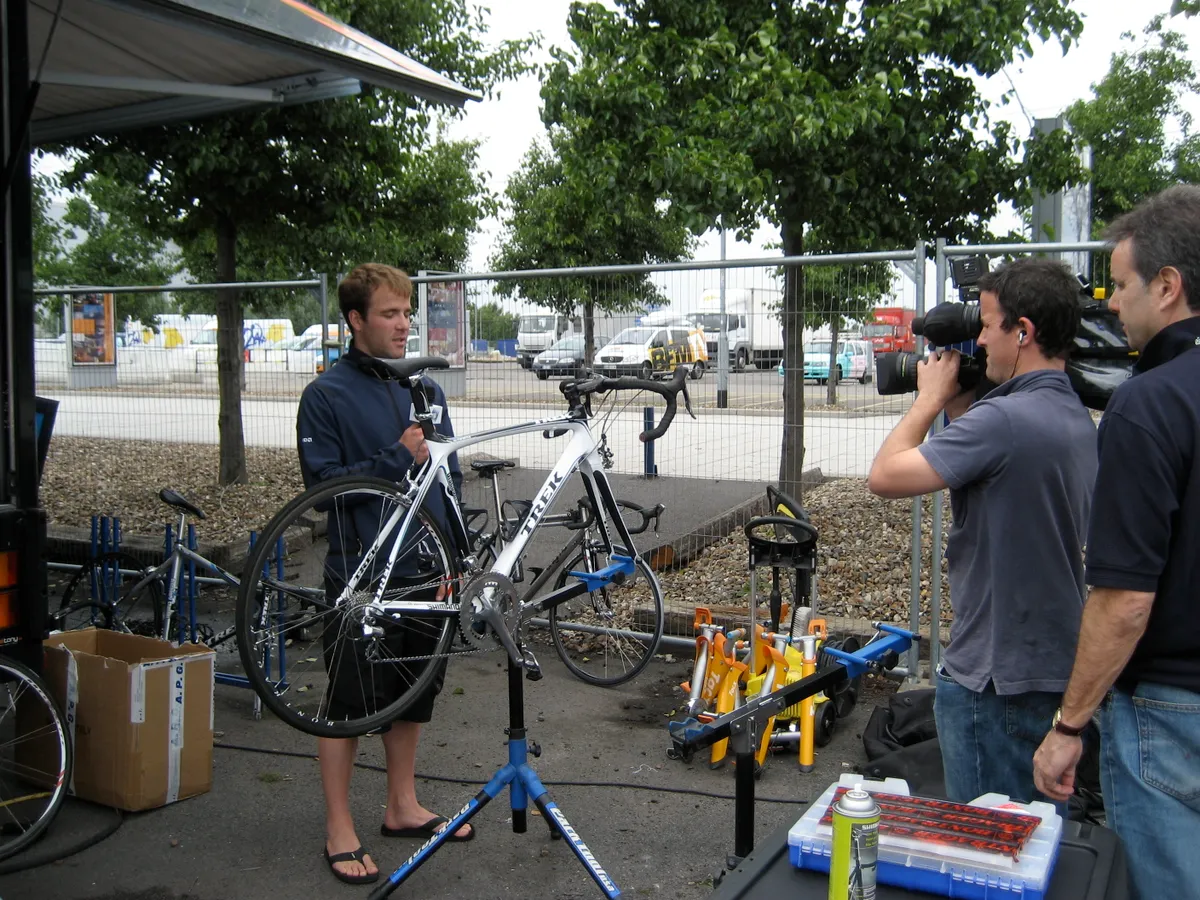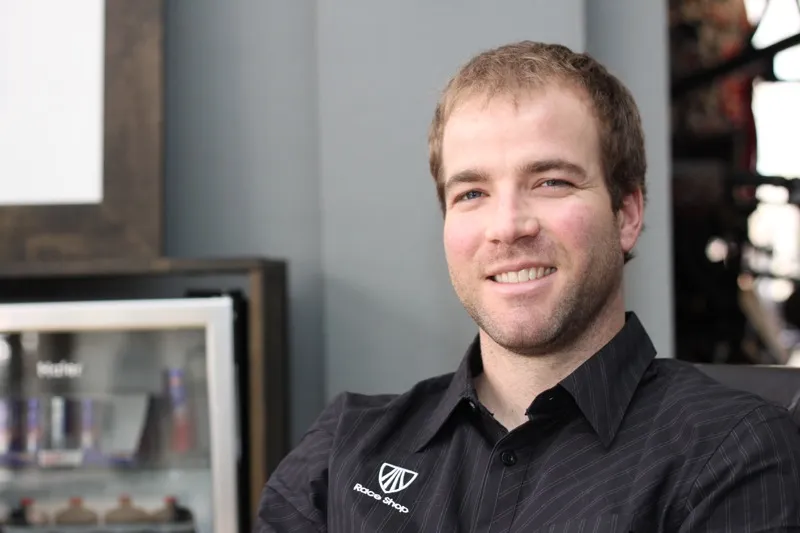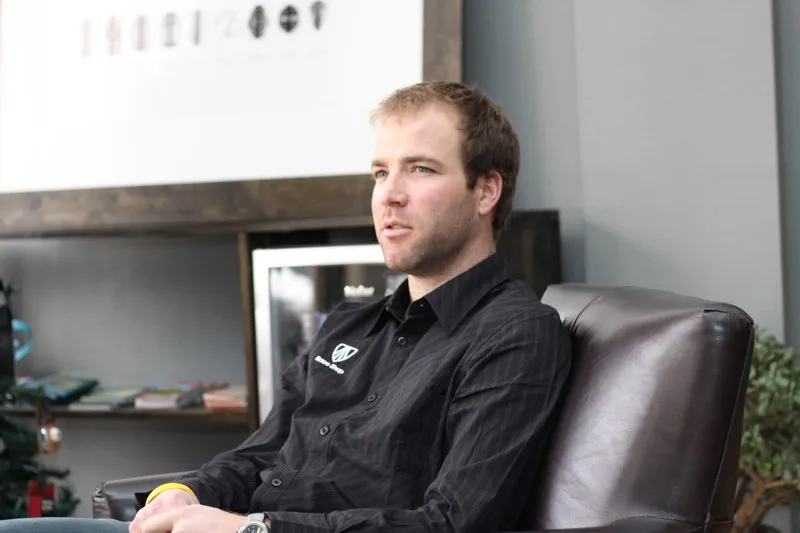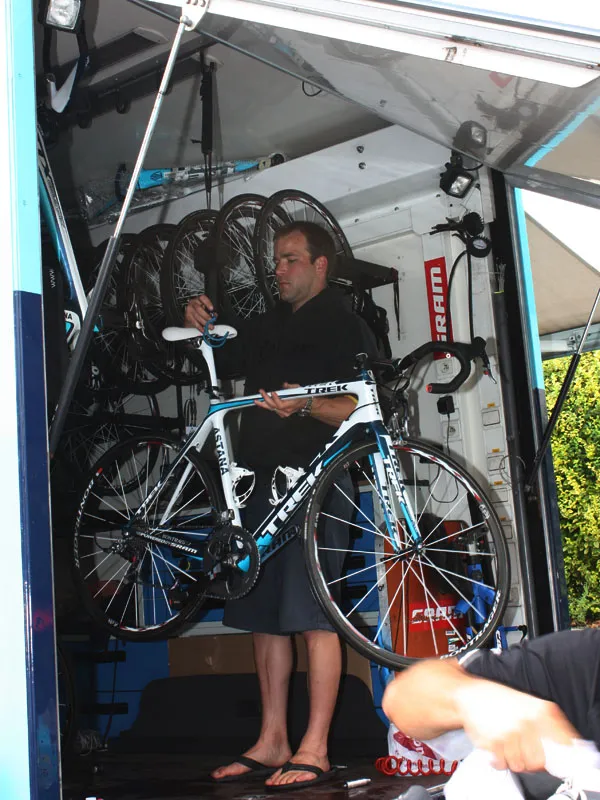Ben Coates is an average guy who loves bikes. But he's taken that passion, and a far-from-average dose of natural talent, and used it to achieve a meteoric rise through the industry, culminating in his appointment as Trek's road team liaison.
Now tasked with putting the new Leopard Trek squad on the path to ProTeam glory, he's previously worked with RadioShack and Livestrong and is known as Trek's 'Lance (Armstrong) handler'. Matt Pacocha finds out more...
A normal guy who gets to do some pretty cool stuff
Coates considers Armstrong a personal friend. Actually, he considers many of the sport's most famous, or infamous, as friends, but he’s quick to play this down. “My wife continually tells me, ‘you might do cool stuff, but you’re not cool,” says Coates. “It’s true; I’m not a celebrity, I’m not a social figure, I’m not rich, I’m not famous. I’m just a normal guy with a regular job that gets to do some pretty cool stuff.”
Despite his humble attitude, this 29-year-old has had a meteoric rise, from a local bike shop sales job, to the head mechanic for the Subaru-Gary Fisher team, a short stint as a junior product manager at Trek and now to the brand’s key, and sometimes sole, avenue for communication with their highest profile athletes and teams.
His age, especially in the infancy of his career, caused many people to question his abilities, but it’s an issue the young Coloradan quickly overcame and now his reputation among the riders he works with precedes him. “There were definitely some hiccups,” says Tyler Pilger, Trek’s road product manager and then Subaru-Gary Fisher team manager, of Coates' first months with the Fisher squad. “Every hiccup Ben took totally personally – I could see it in his eyes – and they weren’t things that ever happened twice."
“The thing that floored me was to find out how young he was,” says Alex Wassmann, SRAM’s team and athlete liaison, about his first meeting with Coates in 2008. “I remember thinking, 'wow, this guy is really young'. Ben’s really earned that trust from the guys at Trek to be able to be their sole spokesperson at any given time to Johan [Bruyneel, directeur sportif for RadioShack], to the elite athletes out there and to the UCI. He handles himself very well – very carefully.”

Coates returned to the shop where he cut his teeth as a mechanic for this photo shoot; it's now a Trek concept store
As Coates rose through the ranks, he quickly gained respect from athletes and supporting staff. “I’ve taken the same tack since I started and that’s honesty,” he says. “I'm unbelievably well supported at Trek, but we have limitations and we have agendas, and lying about your limitation or agenda gets you in trouble… Stuff comes out, it always does. These guys spend their life on their bike and they know what products do, so I've always been honest about what we can’t do, what we can’t fix, what they have to deal with and what we can make.”
Coates also has a knack for asking questions – tons of them, and generally the right ones. "There's nobody who asks, ‘why’ as much as he does,” says Pilger. “He does it in everything, he's just so curious, and I think that’s why he learns so quickly and can absorb it all.”
As Trek expand their ProTeam program, Coates has moved to Europe where he finds himself managing an ever-expanding stable of superstar athletes and, for the first time, a growing team of Trek employed team and athlete liaisons.
What exactly is the job?
In his first year in charge of Trek's team liaison, 2007, Coates managed both their on- and off-road programs. Since 2009, when Martin Whitely launched the Trek World Racing mountain bike squad and Lance Armstrong made his comeback to professional cycling, Coates has been dedicated solely to the brand’s road efforts.
Besides the ProTeam squads, RadioShack and now Leopard Trek, Coates manages all of the company's other road sponsorships, from Pro Continental outfits, like Team Marco Polo, down to regional teams. He's there to ensure that the Wisonsin-based company live up to the commitments they've made to their sponsored riders – and also that Trek are getting the necessary returns from their investment, in terms of product development, media exposure and marketing.
“He’s in a very complex environment right now because there are wants and needs that the team have, and there are wants and needs that Trek have, or other suppliers have,” says Pilger. “He ends up in a lot of complex negotiations with sponsors, and over how and where we’re going to deliver equipment.”
One of the key parts of Coates' job is getting feedback from racers to help improve Trek's products. “We think that the rigors of racing are so far beyond what a normal rider’s product will see in its lifecycle that if you can uphold the needs and wants of the team then you’re very likely going to be on target with what the consumer market demands," he says.
The job involves lots of travel, a grasp of several languages, a good understanding of the cycling culture in different countries and sound technical knowledge – “The Speed Concept is so tech advanced, it’s almost unbelievable,” says Coates. The liaison is also an ambassador for the company, meaning that he must wear a Trek face all the time and never, no matter the situation, get angry.
Trek recently hired Matt Shriver – the former coach of the Fort Lewis collegiate cycling team, based in Durango, Colorado, and a racer who made a name for himself by setting the pace for Armstrong’s victory at the Leadville 100 mountain bike race in 2009 – to take over as the primary contact for RadioShack, Livestrong and Lance from Coates.
Asked what advice he'll give Shriver, Coates says: “Your job never begins or ends. If somebody invites you to do something and it doesn’t conflict with something immensely important you always go. Oddly enough that was the best piece of advice that I got from my predecessor. If the guys ask you for a coffee, you go; if they ask you for a beer, you go.
"If it means you’re an hour later to your hotel, up later or up earlier or otherwise inconvenienced, it doesn’t matter; you always go. And on top of that, if you pay it’s even better. They appreciate that, it doesn’t cost much and it means more to the people you work with than the [face] cost. The relationships are invaluable. You never promise something that you can’t deliver. And honesty is the most important policy.”
In 2010, Coates spent roughly 250 days on the road. He logged 275,000 miles in the air – roughly 200,000 on United Airlines, with the remainder split between other carriers and Armstrong’s private jet. In four years of working with Trek’s professional road teams he's halfway to United Airlines' million-mile status.
If you do the math, it’s easy to work out what Coates’ average day entails – sitting on a plane. But he’s quick to point out that there's no such thing as an average day. “Today I woke up to a conference call about some UCI stuff with the manufacturing group that we’re a part of; I have an interview with you; I’ll go to visit an athlete after this; I’ll go back and sit at my desk for a few hours and then I have a product conversation about helmets, saddles; then a logistical conversation with the manager of our race department," he says. "That’s a fairly typical office day.”
The Lance effect
Coates first properly met Lance Armstrong during his first attempt at the Leadville 100 mountain bike race in 2008. Yes, they'd shaken hands before, but this was the first time the two had worked together. “He was training in Aspen and we had a new Top Fuel coming out,” says Coates. “He wanted to race a 29er but I was sure that the Top Fuel, [which] he hadn’t seen yet, was a better bike for him. It turned out I built him a Top Fuel and a [then Gary Fisher] Superfly and drove them to Aspen.
“I thought I was going to drive up, drop the bikes off and I was out. He walked out of the house, looked at me and walked back into the house, and I was like, ‘oh great, that went well.’ But he came back with a yellow bracelet and handed it to me and that session turned into a four-hour [back and forth on mountain bikes]. I fell into a really great set of circumstances where he didn’t know much about mountain bikes or the race and I had the background of being a professional mountain bike mechanic.”
Armstrong asked Coates to come back the following day to work on the bike setup and choice some more, and it all rolled into Coates supporting him, from the Trek side, for his Leadville aspirations. Coates says the trust came quickly – likely because he took the relatively low-stress endeavor of Leadville so seriously.
A month after Leadville, Armstrong emailed Coates asking for a time trial bike. “I don’t know why but I asked him, 'what do you need a time trial bike for, are you coming back?', and I didn’t get an answer,” says Coates. “I was the first person at Trek to know. Well, at least I think I was – John [Burke, company president] may have known. When I went to deliver it we started talking. It was a no brainer decision – Lance was coming back to racing… this was going to be crazy.
“So, I’m the person at Trek that Lance deals with. We’re integrating Matt Shriver into that position now, but since he’s come back, he's really only dealt with John Burke and me. So yes, for the past few years I'd be considered Lance’s liaison.”
The seven-time time Tour de France winner's marketing value for Trek was obvious but he also helped with product development. “He's helped us produce better products in an odd way,” says Coates. “For instance, Lance comes to me and says, ‘I need a new time trial bike.' Why do you need a new time trial bike? ‘Because I think there are other time trial bikes that are faster out there.' Okay, what makes you think that? ‘I don’t know, I’m just pretty sure it’s true.’
"Then a couple of days go by and he says, ‘actually I don’t care, I just need the fastest time trial bike out there and I need you to prove it to me.’ He’s not saying, 'I need it shaped like this' or 'it needs to handle like that'; it’s 'you guys know how to do this, make something better and then show me that it’s better'."
Coates is close to Armstrong. He’s stayed at his homes, flown in his jet and lived alongside him. It’s something that might skew a person’s reality, yet it seems that Coates has remained humble, which may be his most impressive achievement to date. “What people don’t understand about it is, yes, when I go to Austin I stay in Lance’s house, but it’s not my house,” says Coates.
“Or when we go someplace particular for a test or function for him we stay in a nice hotel or fly in a nice plane or whatever, but 95 percent of my year is spent standing in a parking lot, sleeping in a crappy hotel, working from 6am to midnight doing the normal part of my job. So the balance between the extraordinary and the ordinary is very highly skewed toward the mediocre."
“I like Lance,” he continues. “He’s a friend of mine. Outside of working, he’s a friend of mine. We just went down for the Mellow Classic [a mountain bike race run by Armstrong's Mellow Johnny's Bike Shop] and we hung out with him and his girlfriend, drank wine and had a nice conversation. He’s a normal guy, he talks about normal stuff; we sat around and watched NASCAR. It’s not like everything he does is extravagant. There’s a certain amount of importance that he garners, but it’s only in association to him.”
Humble beginnings
Coates didn’t find his love of bicycles until his freshman year of college, when he bought a mountain bike. “[I] was riding Walker Ranch [a staple to Boulder, Co’s limited off-road riding options] by myself – maybe my third mountain bike ride ever and I'd been talked into clipless pedals. At the bottom of Walker Ranch there’s a little creek crossing and I tried to jump it, but I ended up burying my front wheel into the opposite bank. I went over the handlebars and taco’d my front wheel.
“I didn’t know anything about bikes so there was no way I was going to fix it and ride it out, so I had to hike out what seemed like forever – it might have only been a mile-and-a-half or two miles but it seemed like forever – in cycling shoes. I got in my car and drove straight to the bike shop, and it cost $40 or something to get my bike fixed and I was in college, so $40 was a lot of money. I remember in that instant, I thought, ‘I can figure this out, I’m going to buy a book and this is my thing. I’m going to ride bikes'.”
The book Coates bought was Zinn & The Art of Road Bike Maintenance. “Oddly enough, it probably cost me more money than it saved me,” says Coates. “It gave me a false sense of confidence that I could actually fix things. I’d get halfway in and find there wasn't enough information or I couldn’t figure it out or it didn’t look exactly like the drawing.”
From there, Coates went on to score a job at the shop where he bought his first bike, but in the front of the house selling bikes, not working on them. "I was pretty science driven," he says. "I have a degree in biology and studied biochemistry and was thinking along those lines for a career, but then I finally got a job in the shop and the people there were so passionate and so happy with their lives and what they were doing.
"In particular there was this guy, who’s still in the industry [he now runs Santa Cruz’s demo bike program], named Ariel Lindsley. He taught me how to be a mechanic. I was a sales person at the shop that didn’t know anything and when we were slow I'd ask him, 'what are you doing? what’s going on?'. I'd just bug the crap out of him. He took me on rides, taught me about bikes, taught me about all kinds of stuff. He was patient and to this day I think he’s one of the most truly authentic cyclists that I can think of.”
“Ben just kind of wandered into Cutting Edge Sports for ski and some bike stuff, but he really wasn’t a bike guy yet,” says Lindsley. “He was one of those guys that wanted to see what was going on all the time… and I was happy to show him a few things. I don’t know what it was that struck him about bikes but he decided he wanted to be into it. People have always helped me along the way, just by letting me be around and learn by doing; I think Ben is that kind of person. There aren't a lot of people who are patient enough or willing to open that door, so maybe that’s what I was for Ben.”
Equipped with a mechanical foundation from Lindsley, Coates then scored a job with a grassroots mountain bike team sponsored by Ritchey and K2 as their wrench. He spent the summer straight out of college driving the team’s truck and trailer around the country; his only payment was a free bike, kit and place to stay at the races. It was slave labor but it exposed him to the mountain bike racing scene, where Tyler Pilger, then manager of the Subaru-Gary Fisher Team, took notice. Later in the season, when the Fisher mechanic was forced off the circuit by a family emergency, Pilger called Coates to stand in.
"Even though Tyler was willing to pay me for the weekend and it was a higher profile team... I told him, ‘look I made this commitment and I just can’t not make good on it. I can’t make good on both so I can’t go there and work for you'. I think he liked that about me; that I passed up the better opportunity. After that I kept bothering him about being the assistant and then one day he called me and said, 'look we’re looking for a head mechanic'.
"Their head mechanic at the time was Ian Moore, who's among the best race mechanics in mountain biking, ever. He was there with the original guys, Stik [Craig Glaspell], Monkey [Chris Vasquez], Kevin Kelly; a handful of guys that had been doing it for a long time. I told Tyler, 'No, there’s no way. I can’t do the job. I’m a shop mechanic. I can fix a bike but I can’t jerry rig product, I can’t custom make pieces and parts'.”
“Ben is an interesting character that way,” says Pilger. “He’s so capable, but at the time he just didn’t know that he had the experience to do it. He’s such a smart guy and just gets life in general… From the interactions I'd had with him, I knew he had all the characteristics and it was just the matter of learning some specific skills and the day-to-day.”
And into the big leagues
The pair went back and forth for a month before Coates took the job. “He wore me down,” he says. “It was a scary prospect. It was an Olympic year, there were three really high caliber athletes who were medal contenders potentially, and it was when the UCI points system was all messed up.
“I can remember, my girlfriend at the time was graduating from college and I was leaving for a six week trip – my first trip ever to Europe – the next morning. I'd received eight bikes that I had to build and travel with that day, so I had to build the bikes, pack and party all at the same time. It was funny, and it was definitely a good prelude to how that life went."
“One of the things I recognized early on as a mechanic is that you can’t win a race for your rider but you can certainly lose it for them,” adds Coates. “If you don’t fix the bike right you can lose the race, but if they have zero confidence in their equipment you're also hindering their performance. That was probably the hardest thing – providing the confidence, a sort of social psychotherapy type portion of the job. It still remains the most difficult thing. It’s really why I have a job.
“There’s an engineer at Trek who knows each individual product better than I do, but each of those engineers is an unknown quantity to a rider – they have no credit or knowledge according to the racing scene, no equity basically – so there has to be somebody who conveys all of the information and has all of the interaction because that mental aspect is so important [for the riders.]”
Just three years after anxiously accepting the job with Fisher, brand owners Trek assigned Coates to manage their relationship with Johan Bruyneel’s Discovery Channel team. “It grew from there,” says Coates. “When he [Bruyneel] came to Trek in November [2008], it was Johan, John Burke, Joe V [Vadeboncoeur, head of Trek’s product and marketing departments] and I sitting in a room discussing our ability to sponsor Astana. And the way that panned out, we signed up to provide everything – clothing, casual clothing, bike, everything – and John and Joe just said [to me], ‘figure it out’.”

Running through one of the team bikes for a TV crew at the 2007 Tour de France
With that, Coates was charged with getting Astana up and running as a Trek sponsored outfit. It was a monumentous task and risky marketing move. In the end it was the ultimate test for Coates and it proved his abilities, both to himself and everyone at Trek. “I don’t stand alone," he says. "I may be the only guy standing in the parking lot but when John and Joe said, ‘take care of this, figure it out’ it wasn’t all on me...
"[It was about having] the leverage and the leeway to use the resources that the company have to put our best foot forward. Really, I didn’t do anything. The thing I did was push and push and push. Being relentless and paying attention to the needs are the only things I did… Everyone else at the company made it happen.”
The big move
Never one to back away from a challenge, two weeks ago Coates and his wife packed up and moved to Luxembourg City where he has the all too familiar task of getting a new pro road team – Leopard Trek – up to speed with all things Trek. It’s a big move for the couple, neither of whom has lived outside of the US.
“I think the bottom line for Trek is that we have the intention of being the best race support company, period, to every team we have,” says Coates. “When we started the conversation about having another team the first thing we did was talk to RadioShack. They [the team management] have been partners with us for a long time and we gave them the heads-up and asked for their opinion. We were honest, as good partners would be.”
Coates explains that ‘brand perception’ was the primary motivator for Trek to sponsor another, potentially more powerful European race program. RadioShack are looked upon as an American team in Europe and Trek are trying hard to market their global aspirations, which Leopard Trek should help fulfill. It’s not just about winning races in Europe, but supporting a European program. “Our growth outside of the US is becoming more and more important,” he says.
While the move should cut Coates' time spent in airplanes substantially, it won’t likely do much to put a dent in his nights away from home. He left us with this: “The days are long and it’s hard. It’s a passion based job. You’re never going to make enough money to justify it. If you don’t love cycling and you don’t love the experiences you get out of it, you’re never going to be successful at it. You can’t justify the hours that it takes to do the job properly with any other means than passion.”


